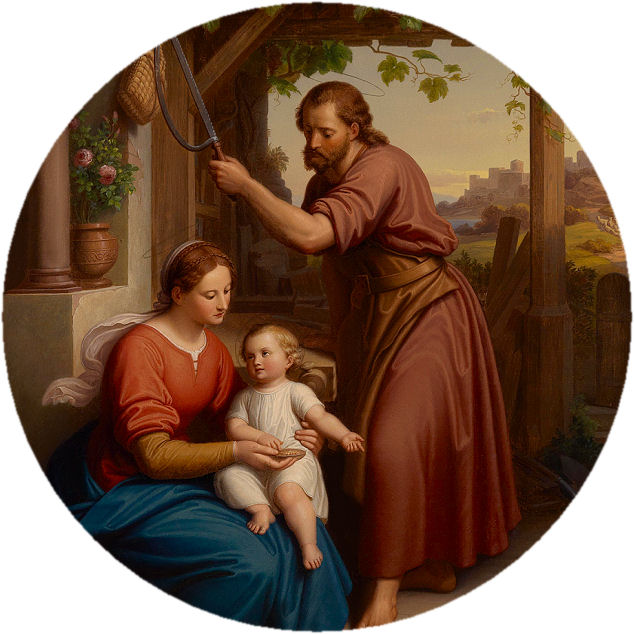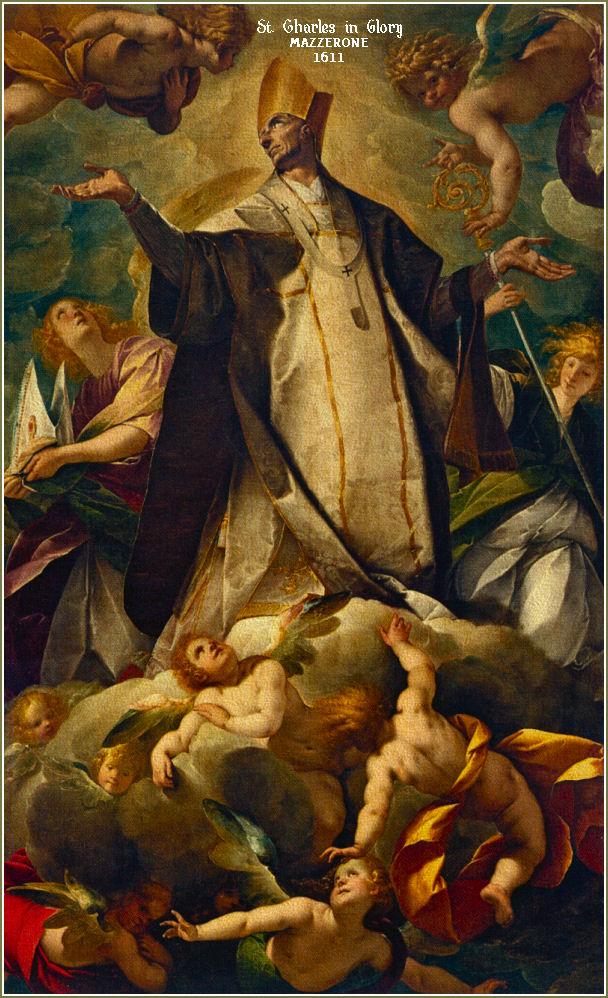  THE COMMANDMENTS Taken from THE CATECHISM EXPLAINED Written by Fr. Francis Spirago; Edited by Fr. Richard Clarke, SJ with Nihil Obstat and Imprimatur, New York, 1927  SECTION B: THE COMMANDMENTS THE THIRD COMMANDMENT OF GOD 2. THE PRECEPT OF LABOR Work may be either bodily or mental. It must not be thought that by those who work, only servants, artisans, operatives, and the like are intended; students, priests, schoolmasters, doctors, etc., are included under the term. The latter do not indeed work with their hands, but with their head; and mental work is far more difficult and fatiguing than physical exertion. Work was formerly held to be degrading, until it was sanctified by Our Lord. Among the pagans there were two classes of people: the upper or governing class, and the slaves, the working class. In some states artisans were deprived of civil rights. As work was regarded as a degradation, men used either to join the army, or spend their days in idleness. At Our Lord's coming He gave dignity to labor by His example; He chose' a carpenter for His foster father, and from an early age He worked Himself. In the parable of the laborers in the vineyard He gave His hearers to understand that work was necessary for salvation (Matt. xx.). Many eminent men have not disdained to engage in manual labor. St. Paul earned his own living. by the work of his hands (Acts xx. 34), he was a tent-maker (Acts xviii. 3). The monks of old times occupied themselves with agriculture, and in transcribing manuscripts. Work is no humiliation; on the contrary, it is greatly to a man's credit to maintain himself by his own exertions (Leo XIII.). Vice and pride alone really degrade a man. He who serves his fellow-man because it is the will of God, really serves God Who lays the obligation upon him. Christ Himself did not come to be served, but to serve. He who is the servant of another man is more to be respected than he who is the slave of his passions. 1. The obligation to work was laid upon mankind by God after the Fall as a penance. Previous to the Fall of our first parents work was only a relaxation for man. But after the Fall God said to Adam: "In the sweat of thy face thou shalt eat bread, until thou return to the earth out of which thou wert taken" (Gen. iii. 19). 2. Every individual who can work is bound to work. St. Paul says: "If any man will not work, neither let him eat" (2 Thess. iii. l0). No man is free from Original Sin, and on account of Original Sin we are obliged to do penance, thus all must work. In order to compel man to work, God has ordained that the earth shall not afford him nourishment unless it is cultivated. If no one labored all the people on the earth would die of hunger. ,The rich are not exempt from this obligation; they can give the proceeds of their work in charity, or at least devote them to some good object. Royal personages have often worked costly vestments for the Church; queens and princesses used to spend a great part of their time in this manner. Upon a rich man being once asked why he was always working at something or other, though there was no need for him to do so, he replied: "Do you think almighty God has given me my hands for no purpose?" St. Benedict, in making the rule for his monks, provided that they should be occupied alternately with prayer and work. Nothing but old age, bodily infirmities, and sickness exempt from this universal law. "Man is born to labor and the bird to fly" (Job v. 7). Even the lower animals teach us in this respect; witness the industrious ant (Prov. vi. 6). "We exhort you to work with your own hands, as we commanded you" (1 Thess. iv. 11). 3. Every man is bound primarily to perform the work appertaining to his calling or station. There are various grades or states of life in human society; there are ecclesiastics, physicians, lawyers, soldiers, married people and unmarried; human society is like a body, each member of which has its own individual functions (1 Cor. xii. 12), or like a clock, in which. all the wheels, large and small, work into one another. It is God Himself Who calls every man to his special state, hence we speak of it as his "vocation," and God gives everyone the graces necessary to his calling. Thus, if a man feels inwardly drawn to one particular state he ought to obey this attraction, just as the migratory birds obey the, motion that teaches them to seek a warmer clime in the autumn. Those who do not follow that interior impulse, but force themselves to embrace a calling for which they feel no inclination, too often share the fate of the birds who do not journey southwards; like them they do not thrive. Parents ought not to compel their children to enter a profession for which they have no attraction. As our vocation comes from God, in fulfilling its obligations we serve Him; consequently the duties of our state ought to take precedence of all others. In some cases we have to leave God for God. The object for which Christ came into the world was to redeem it, and when the time came for Him to fulfill the duties of that vocation everything else was made subservient to it. Remember His words in the Temple when He was twelve years of age (Luke ii. 49), and how He neglected to take food, while conversing with the Samaritan at Jacob's well (John iv. 34). So Moses acted; when God told him on Mount Sinai that the people had sinned grievously, he immediately left converse with God, and returned to the camp (Exod. xxxii. 7). Careful fulfillment of the duties of one's calling leads to perfection; the neglect of them entails fatal consequences both in time and in eternity. Those who conscientiously accomplish the duties of their calling are conscientious in all things. Like the principal wheel in a machine, if this goes well, all else goes well; but if it stops, the whole of the works are at a standstill. In the process for canonization, the first inquiry is how the candidate has fulfilled the duties of his calling. It is a mistake to imagine that time and trouble devoted to the duties of one's calling are wasted; on the contrary, there is no speedier means of attaining perfection. Those who, deluded by the devil, neglect their duties for prayer and pious works commit sin. "If a man," says St. Francis of Sales, "does not perform the grave obligations of his state, though he raise the dead and practice all manner of austerities he is in mortal sin and will perish eternally." In vain those pray who will not work; all piety is false which is not subordinated to the claims of our calling, for no state of life, if lawful, is a hindrance to salvation. 4. We must not forget God in what we do; before and during our work we should implore His aid and renew our intention. God's blessing we need if our work should succeed. Witness the miraculous draught of fishes (Luke v.). Three men with God's blessing will do more work in a day than ten without it. To begin one's work without prayer is as if a soldier went to battle without weapons. St. Paul exhorts us to renew our good intention in the words: "Whether you eat or drink, or whatsoever else you do, do all to the glory of God" (1 Cor. x. 31). In all our actions we must take aim, like one who shoots at a mark. However long a row of ciphers a child makes on a slate, they have no value whatsoever until a figure is placed before them. So it is with our works: in themselves they are worthless, but if they are performed in God's name, He makes them fruitful and meritorious. And as when writing one dips one's pen from time to time in the ink in order to write on, so we ought to look up to God to gain fresh strength for our work. We should do like the mariner, who looks up at the stars or consults the compass that he may steer his course aright. The Angels, while ministering to man, do not cease to gaze upon the countenance of God. As the builder constantly uses square and plumb-line, so all our actions should be measured by the rule of the love of God. "Pray without ceasing" (1 Thess. v. 17). Accustom yourselves to utter ejaculatory prayers at your work and take for your motto the words: Ora et labora. Work and pray; and while putting your hand to your work, raise your heart to God. 5. Labor obtains a temporal and an eternal recompense, because it is a kind of Divine worship. The temporal recompense is contentment and earthly happiness. As the law of work was laid upon Adam in Paradise by God as an expiation of his fault, when he had acknowledged and confessed it, all who work do the will of God, and perform an act that is pleasing to Him. Work in its character of penance, is more excellent than prayer. St. Francis of Sales, when obliged to curtail his prayers because of the press of business, excused himself by saying, "In this world we must pray by work and action." Work has a bitter root, but the fruit it bears is sweet. It has a temporal reward: the idler finds his time long and is a burden to himself, whereas the industrious is contented and cheerful. He experiences the truth of Our Lord's words: "My yoke is sweet and My burden is light" (Matt. xi. 30). The devil cannot molest the busy man with his temptations; he has no leisure to listen to his enticements, any more than a man will leave some important transaction to go where music and dancing are going on. Work generally insures earthly prosperity. The bees who gather honey all day long in summer, lay up in their hives a store of nourishment for the winter. The industrious man's future is assured. A Roman who had accumulated a large fortune by hard work was accused of magic arts. Being brought before the Senate, he produced his tools and said: "Behold the charms I have made use of. The sweat of my brow I cannot show you." Finally labor, like all other acts of penance, merits an everlasting reward. Our Lord says: "The laborer is worthy of his hire" (Luke x. 7). And St. Paul: "Every man shall receive his own reward according to his labor" (1 Cor. iii. 8). The anticipation of a reward sweetens labor, as we see is the case with all the working classes. They labor for a temporal reward, but we for an eternal. St. Bernard told a monk who was always busily employed, that if he continued to work so zealously he need not dread Purgatory. Let us not in our work look so much to what we shall gain by it in time, as to our eternal reward.  For if we only think of present profit we shall work less well, and we shall lose the eternal profit to which we show ourselves indifferent. The precept of labor is transgressed: 1. By indulging in idleness. 2. By the non-fulfillment of the duties of our station and calling. 3. By omitting to offer to God the work that is done. The Relaxations Permitted to the Christian 1. It is lawful for those who work to seek relaxation, for this is a means of renewing one's strength after one's work is done. The bow never unspanned will break; and the man who works without cessation will become unfit for work. Social convivialities are productive of much good; they promote charity and concord. It is God's will that we should enjoy recreation; He has provided us with pleasures in nature alone; the beauteous coloring, the delicious perfume of the flowers; the song of birds, the various kinds of fruit, etc. Our Lord Himself was a guest at banquets, even at a marriage feast, and He speaks without disapproval of music, etc. (Luke xv. 25). 2. We must not, however, indulge too freely in amusements, and certainly we must eschew all those that are sinful; moreover in all our recreations the thought of God must be present to our mind. We must not be too great votaries of pleasure, for diversions are not the object of life, they are only a means of renewing our strength after our work. Life is for work, not for play. Excess in everything is harmful; medicine taken in too large doses is injurious, and the best condiments, if too freely used, spoil a dish. So it is with amusements; they are only to be enjoyed when all our duties have been duly performed. The thought of death is a useful check upon indulgence in the pleasures of the senses; if we remember that at any moment our soul may be required of us, we shall be moderate in our use of enjoyments. An exaggerated love of pleasure and craving for excitement prevails in the present day; one festivity and dissipation follows another, and yet everywhere one hears complaints of the evil times. May not the thirst for enjoyment be the cause? Above all, dangerous or sinful pleasures are to be avoided, such as gambling for high stakes, games of chance which are prohibited, slandering the absent, sarcastic speeches, unseemly words, or contempt of holy things. Those who indulge in such pleasures are like thankless children who delight in offending their father. When enjoying innocent pleasures we should think of God, and our high destiny. The Psalmist says: "Be glad in the Lord" (Ps. xxxi. 11). St. Charles Borromeo is said once to have played a game of billiards; when asked what he would do if he was told the Last Judgment was at hand, he replied: "I should finish the game, for I am playing for the glory of God, and He is present to my thoughts."   HOME------------------------------------TRADITION www.catholictradition.org/Tradition/commandment3b.htm |